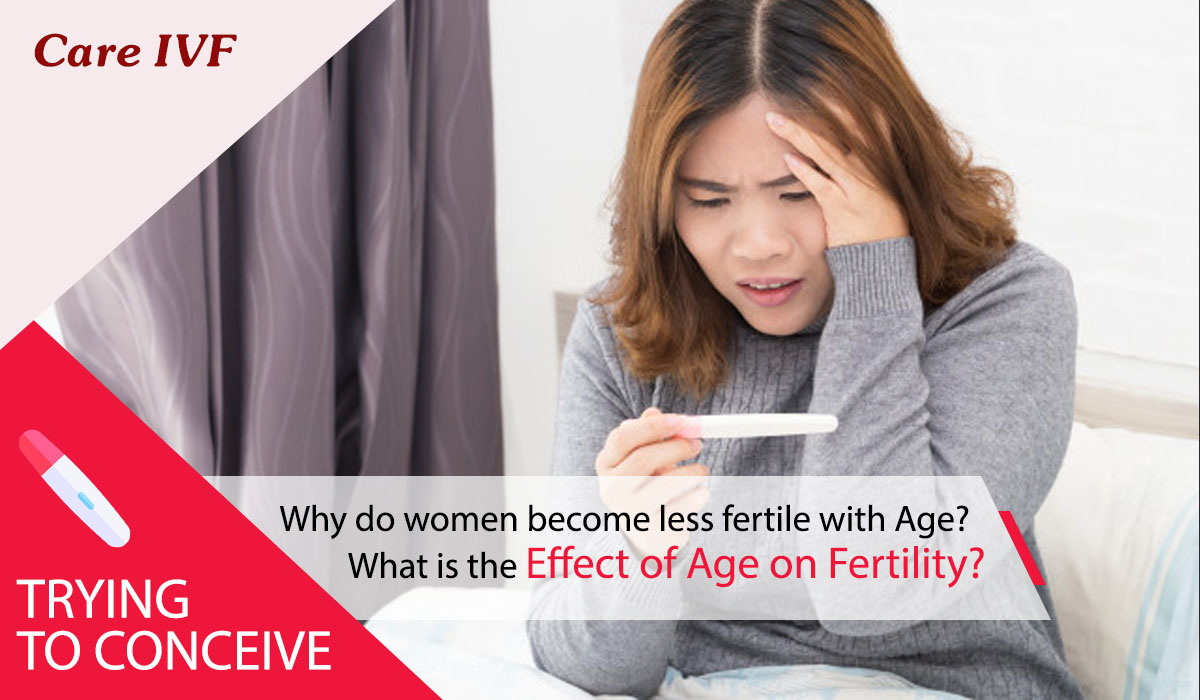

Why do women become Less Fertile with Age?
A woman’s peak reproductive years are between the late teens and late 20s. By age 30 years, fertility (the ability to get pregnant) starts to decline. This decline becomes more rapid once you reach your mid 30s. By age 45 years, fertility has declined so much that getting pregnant naturally is unlikely for most women. This is because women are born with a fixed number of eggs in their ovaries which decline progressively with age.
For healthy couples:
In their 20s and early 30s: around 1 in 4 women will get pregnant in any single menstrual cycle.
By age 40 years: around 1 in 10 women will get pregnant per menstrual cycle.
A man’s fertility also declines with age, but not as predictably as a woman’s fertility.
Why do women become less fertile as they age?
Women become less fertile as they age because they begin life with a fixed number of eggs in their ovaries. The number of eggs decreases as women get older. Also, the remaining eggs in older women are more likely to have abnormal chromosomes. And as age increases, women are at higher risk of disorders that can affect fertility, such as uterine fibroids and endometriosis.
If you are older than 35 years and have not gotten pregnant after 6 months of having regular unprotected sexual intercourse talk with your health care professional about an infertility evaluation.
If you are older than 40 years, an evaluation is recommended before trying to get pregnant.
What are the risks of later childbearing?
Women who get pregnant in their late 30s or 40s have a higher risk of complications. Some of these problems may affect a woman’s health. Others can affect the health of the fetus.
Pregnant women older than 40 years have an increased risk of preeclampsia. Some of the increase in risk may be because older women tend to have more health problems before they get pregnant than younger women. For example, having high blood pressure, a condition that becomes more common with age, can increase the risk of preeclampsia. Studies also show that older women who do not have any health conditions still can have complicated pregnancies.
The risks of miscarriage and stillbirth are greater in women who are older than 35 years. Also, multiple pregnancy occurs more often in older women than in younger women. As the ovaries age, they are more likely to release more than one egg each month The overall risk of having a baby with a chromosome abnormality is small. But as a woman ages, the risk of having a baby with missing, damaged, or extra chromosomes increases. Down syndrome is the most common chromosome problem that occurs with later childbearing. The risk of having a baby with Down syndrome is
- 1 in 1,480 at age 20 years
- 1 in 940 at age 30 years
- 1 in 353 at age 35 years
- 1 in 85 at age 40 years
- 1 in 35 at age 45 years
Despite the challenges, many women older than 35 years can have healthy pregnancies and babies. Seeing a health care professional before pregnancy(preconceptionally) and receiving good prenatal care during pregnancy are key.
How to prevent age related pregnancy complications?
If you want to get pregnant soon, you should try to be as healthy as possible before pregnancy. Steps toward better health include stopping alcohol, tobacco, and marijuana use. You also should start taking folic acid to help prevent neural tube defects.
A pre pregnancy health care visit is a time for your ob-gyn or other health care professional to review your medical and family history. He or she also will review any medications you take and your immunizations to be sure that you have all of the recommended vaccines. Your ob-gyn or other health care professional also may
- ask about your diet and lifestyle
- discuss how you can maintain a healthy weight before getting pregnant
- recommend screening for sexually transmitted infections (STIs)
- discuss the option of carrier screening for you and, if needed, your partner
Are there ways to preserve fertility?
Currently, there is no medical technique that can guarantee fertility will be preserved. If you know that you want to have children later in life, one option may be in vitro fertilization (IVF). With IVF, sperm is combined with a woman’s eggs in a laboratory. If the sperm fertilizes the eggs, embryos may grow. Embryos can be frozen and used many years later. When you are ready, an embryo can be transferred to your uterus to try to achieve a pregnancy. The chance that IVF will work for you depends on many factors, including your health and your age when the embryos are frozen. Talking with a fertility expert will help you understand your chances of success with IVF.
In a procedure called oocyte cryopreservation — “freezing your eggs”—several eggs are removed from the ovaries. The unfertilized eggs are then frozen for later use in IVF.
Article Tags
About the author

Leave a Comment